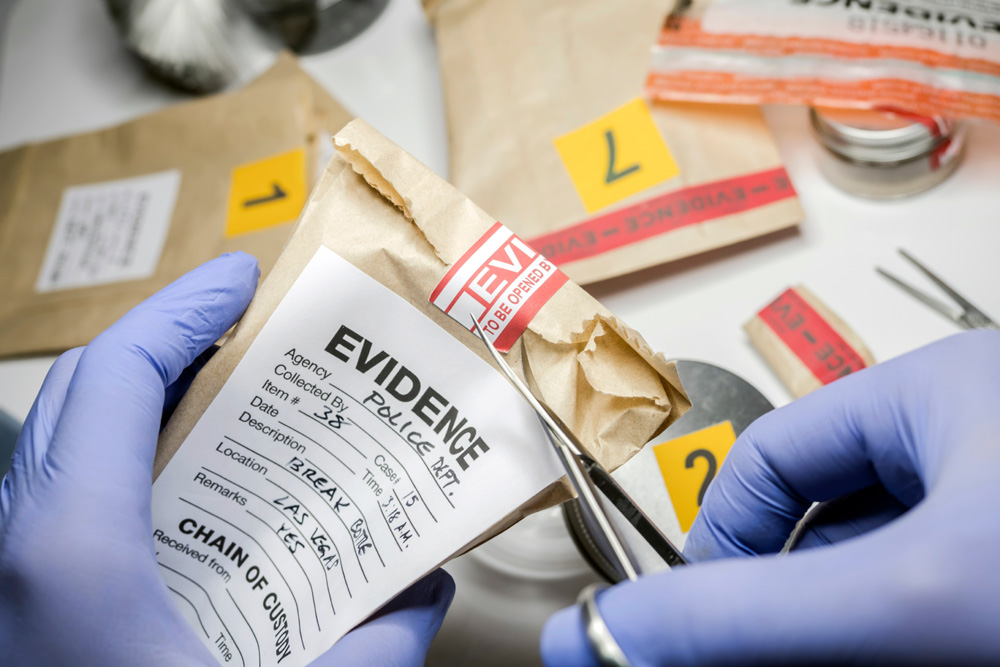
What is Evidence Tampering?
In Florida, evidence tampering is classified as a third-degree felony, which can carry severe penalties, including imprisonment and hefty fines. It involves the alteration, destruction, or concealment of physical evidence with the intent to impair its availability in a legal proceeding.
At Fighter Law, we understand the profound implications that evidence tampering can have on the integrity of the judicial process. When evidence is tampered with, it not only jeopardizes individual cases but also undermines public trust in the legal system. Our board-certified team will work hard to protect your rights every step of the way.
Examples of Evidence Tampering in Criminal Cases
One common instance includes a defendant concealing physical evidence, such as hiding a weapon or drugs, to prevent law enforcement from discovering it during an investigation. Another example is the alteration of documents or recordings that may be relevant to a criminal proceeding, which can mislead law enforcement and prosecutors.
In more egregious cases, people may resort to fabricating physical evidence to support false claims or misdirect the investigation. For instance, creating false evidence, such as fake alibis or counterfeit documents, can severely undermine the integrity of the justice system.
The Legal Consequences of Evidence Tampering
The legal consequences of evidence tampering can be severe, as individuals charged with tampering face a range of potential penalties. For instance, a third-degree felony can result in a sentence of up to five years in prison, along with substantial fines. In order to enforce this charge, the prosecution must prove that the defendant had the intent to impair the availability of the evidence, which can be a challenging task. However, once it is established, the repercussions can be significant.
In addition to incarceration, individuals convicted of evidence tampering may encounter long-term implications on their criminal records, which can affect future employment opportunities and personal relationships. The justice system places a heavy emphasis on the integrity of evidence, and any actions that compromise this integrity can lead to a broader erosion of trust in legal proceedings.
Common Defenses Against Evidence Tampering Charges
When facing charges of evidence tampering, defendants may employ various defense strategies to contest the allegations. One common defense is to argue that there was no intent to impair the evidence’s availability. For example, if a defendant inadvertently altered or concealed evidence without realizing its significance, this could potentially negate the prosecution’s claim of criminal intent. Additionally, a defendant may challenge the validity of the evidence presented against them, arguing that it was obtained through unlawful means or that it lacks credibility.
Another effective defense may involve demonstrating that the evidence in question was not relevant to the criminal proceeding or that it was already compromised before the defendant’s actions. Our experienced criminal defense attorneys at Fighter Law can craft tailored defense strategies that consider the specific circumstances of each case.
The Role of a Criminal Defense Attorney in Evidence-Tampering Cases
Experienced attorneys understand the complexities of criminal law and can craft robust defense strategies tailored to each individual case. We will examine the prosecution’s evidence, identify weaknesses, and challenge the validity of claims made against their clients. We can also negotiate with prosecutors on your behalf, potentially securing reduced charges or alternative sentencing options.
Schedule a Consultation with a Florida Criminal Defense Attorney
If you or someone you know is facing charges related to evidence tampering in Florida, seek the assistance of an experienced criminal defense attorney. At Fighter Law, we understand the complexities and potential consequences of tampering with evidence, and we are dedicated to protecting your rights.
Our board-certified team, including Attorney Jessica Travis, is equipped to provide personalized legal advice and effective defense strategies tailored to your unique circumstances. Contact Fighter Law today to schedule a consultation and take the first step toward safeguarding your future in the justice system by calling (407) 344-4837 or filling out our contact form to schedule a consultation about your case as soon as possible.
Share:
free case evaluation
Fill out the form below for an free evaluation of your case.
Categories
- Birth Injury
- Boating Accidents
- Car Accidents
- Civil Rights
- Criminal Defense
- Cyberstalking
- Divorce
- Dog Bite Injury
- Domestic Abuse Charges
- Domestic Violence
- Drug Charges
- DUI Charges
- Family Law
- Felonies
- Fighter Law Firm
- Firearms
- Firm News
- Guardianship
- Injunction Removal
- Injunctions
- Marketing
- Personal Injury
- Repeat Violence Injunction
- Restraining Order
- Seal and Expunge
- Sex Crimes
- Slip and Fall
- Stalking Injunction
- Theft and Robbery
- Theme Park Trespasses
- Traffic tickets
- Uncategorized

